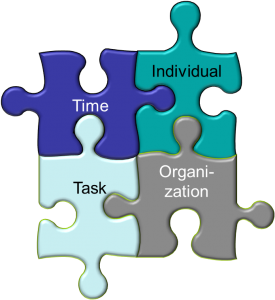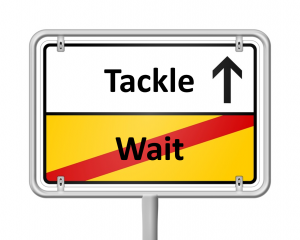There are lots of statistics and reports about why projects get into distress, see also mine in my blog. In my seminars about this topic I’m frequently asked what to do if a project is stuck in issues to get it back on track. I’d like to reflect this part of my job a little deeper here now. To recover Projects in Distress successfully actually is a matter of addressing it’s problems’ causes.
Four factors lead to issues
First of all we need to state like in jurisdiction: It depends. Namely it depends on what might me the reasons why a project is not performing as expected. There is rarely a single cause but usually a mélange of multiple factors which can be clustered in the influences of time, individual, organization and task. To explain very shortly these are problems that derive from time conflicts in project management, skills deficits at the project manager and his team, insufficient interplay between project and organization and within the organization, and from unclear, changing or very complex objectives. And they very often are not at all new but rather trivial, and therefore so very unnecessary and actually not difficult to resolve.
 The issues are not the main problem
The issues are not the main problem
What make the recovery of distressed projects that difficult are rather the root causes, why mistakes are made, than the mistakes themselves. Unfortunately this is also the reason why people often try curing the symptoms then, and waiting for self-healing – with fatal and expensive results. To think that you can find out of the crisis with the same (cheap) measures that have led into it is a preferred self- deception practice then!
To prerecord: the topic organization participates in at least half of the cases in the problems that projects face. That’s why it does not make sense to pin the project manager to the wall then or to challenge the team for increased commitment. The problem mostly cannot be solved by the project or within the project! And it therefore then needs for resolution peculiarly a different support from functional and central departments, and in most cases by the management, too.
Without management’s will for recovery all efforts are in vain
I have seen a lot of projects in distress. Most of them I could help to achieve a return on investment and a business benefit instead. And those had one thing in common: they were recovered driven by the management in the same determined and consequent manner as the management would have done if the company itself were in distress. This by the way also proves how important an organization’s acknowledgement towards its projects is for their success.
My expert advise for recovery
From this long experience I’d like to recommend:
- Have the courage to admit that your project is in trouble, and that it needs help because it will not get back on its feet by own means, or at least unjustifiably slow. As a project manager escalate forcibly, as executive in charge act determined and responsible. A cancelled project is worse for the company and the career than a successfully recovered one!
 Waiting burns money and trust! Therefore act early, i.e. before the project is right in front of the wall (milestone, penalties etc.). The earlier you recognize and tackle the issues the smaller your losses are. And you have more options for measures or negotiations as well.
Waiting burns money and trust! Therefore act early, i.e. before the project is right in front of the wall (milestone, penalties etc.). The earlier you recognize and tackle the issues the smaller your losses are. And you have more options for measures or negotiations as well.- In most cases there is already help in objectification of the situation. Where positions are stuck and block progress they have to be resolved to serve again the interests behind. But many times this is no longer feasible without an impartial third. Anyway before that is done by lawyers and a court you should better make use of the neutrality of an expert assessment which is paid by all parties alike.
- Every recovery needs to provide a balance of interests. The barn door is closed after the horse escaped, the business case will probably not be met as planned – for none of the participants. However a cancelled project doesn’t provide value to anybody! That implies you need to look for cooperative resolution approaches that serve all interests in a “perceived fair” manner. The impartial expert assessment is the basis for such new agreements and measures.
- Success will only come with collaboration of all parties. It might not be as trustful as at the project‘s start, but that can be compensated with neutral audits. If with the help of neutral revision, mediation and control you succeed in overcoming the road blocks you will also succeed in completing the project halfway acceptably, and therefore safeguard ROI and benefits. A strong project management expert, competent in social and methodology practice, will leverage in consequently implementing and executing the necessary measures while also leading the organization besides the projects to success (the emphasis on leading!) to draw on the mistakes root causes as well.
 Sustainable change for prevention
Sustainable change for prevention
That way the first important step is done to improve project management’s esteem also within the organization. To prevent a next, similar disaster executives need to address the causes and invest in their project management’s quality, which means, besides education, at many companies peculiarly a Change Management on corporate level regarding their project organization and culture.
Get yourself independent help
From my statements you can also clearly read a summation to make use of an impartial third, i.e. an external, for the expert assessment and project recovery. They don’t necessarily need to be subject matter or industry experts. There are probably enough subject matter experts in the project team. Was is lacking in nearly all distressed projects is an expert in project management with bold leadership qualities, because he needs to be able to lead not only the project out of the crisis but also its environment. And because that evidently failed by own means you have to hire an external project recovery specialist.
In addition an external is per se rational and neutral, what can be underlined by jointly mandating him by all parties. It is also important that an external can address things open and frankly, even things which wouldn’t be said this way from the internal career ladder to the respective addressees. But every detour is additional loss in time and money, and that’s something no project in distress can afford any more.
And finally because I know how it works !
Are you in charge of projects – in a project leader or management function? Do you experience projects which do not run as planned, are in a crisis situation or out of control? So what are you waiting for, then … ?
Learn more about the topic Project Recovery…

@Henning: i have an idea on your “how” question. Few steps: first find the an executive who feels responsible, they’re not many. (2) Make sure all agreed the project it’s in distress, it’s not granted. (3) convince the PM able to fix it to do it, that’s not simple. (4) repeat this steps with passion and energy ! That’s not easy, though possible for the few who dares! And very rewarding! Happy to elaborate if you pass by Basel or Zug.